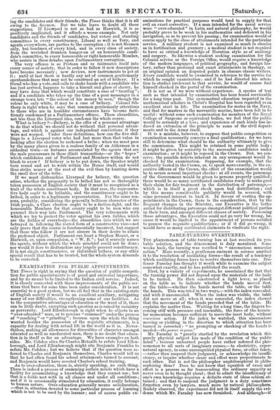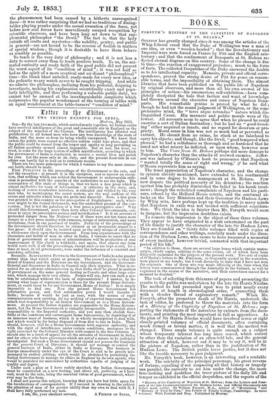TABLE-TURNING OVERTURNED.
Tux phEenomenon of table-turning has at last received its pro- bable solution, and the denouement is duly moralized. Some weeks back, the turning was ascribed to " unconscious muscular action." More recently, a gentleman eminent in science ascribed it to the resolution of oscillating forces—the result of a tendency which oscillating forces have to resolve themselves into one. Pro- fessor Faraday has thought it worth while to examine the subject somewhat exactly, and he has published the result.
First, by a variety of experiments, he ascertained the fact that the turning power did not depend upon the materials of the body to be turned. He then constructed a light lever, so placed on the table as to indicate whether the hands moved first, or the table—whether the hands moved the table, or the table the hands. This was tried in two ways,—with the index concealed, and with it unconcealed. When the index was visible, the table did not move at all ; when it was concealed, the index showed that the movement of the hands preceded that of the table. He explains the matter thus. Waiting for a long time, the fingers be- coming stiff with pressure and insensible, the force of the muscu- lar momentum becomes sufficient to move the inert body, without conscious action. If the index be watched, this unconscious moving or yielding in the direction to which attention has been turned is corrected : " no prompting or checking of the hands is needed—thepower is gone." Mr. Faraday is " greatly startled by the revelation which this purely physical subject has made of the condition of the public mind" ; because unlearned people have rather referred the phw- nomenon to all sorts of imaginary causes,—to electricity, super- natural agency, to some unrecognized physical force, or other fancy, —rather than suspend their judgment, or acknowledge its instill]: cieney, or inquire whether cause and effect were proportionate to each other. But is not the philosopher nnphilosophical in philo- sophizing thus ? Does he not know that equation of cause and effect is a process so far transcending the ordinary capacity as never even to be thought about; that to admit the insufficiency of one's own knowledge requires a definite state of ideas seldom at- tained ; and that to suspend the judgment is a duty sometimes forgotten even by lawyers, much more by natural philosophers. Rudely observed, the experiment did not in itself supply the evi- dence which Mr. Faraday has now furnished. And although—if
the pluenomenon had been caused by a hitherto unrecognized force—it was rather surprising that we had no traditions of dining- tables playing pranks under the casual evocation of the force, yet before now real forces have marvellously escaped recognition by scientific observers, and have been long set down to that sup- plemental philosopher "the Devil." The fact is, that the laity outside all crafts and mysteries—the nobility, gentry, and public in general—are not bound to be the reverse of foolish in matters of special wisdom; though it is desirable to have them behave as sensibly as possible.
To teach is the very duty of philosophy; and it is not less a duty to correct error than to teach positive truth. To us, the ani- mated curiosity and ready faith of the good public did not present the worst aspect of its " condition of mind " ; it was not half so bad as the spirit of a more sceptical and soi-disant "philosophical" time—the blank blasé unbelief, ready-made for every new idea, or the pedantic weary watch never to be caught tripping. And while we admire the philosopher, inclining from his pedestal, deigning to investigate, making his explanation scientifically exact and popu- larly intelligible, and thus performing a valuable public duty, we cannot but be amused at the inextinguishable simplicity which reciprocates the popular wonderment at the turning of tables with an equal wonderment at the table-turners' "condition of mind."



























 Previous page
Previous page